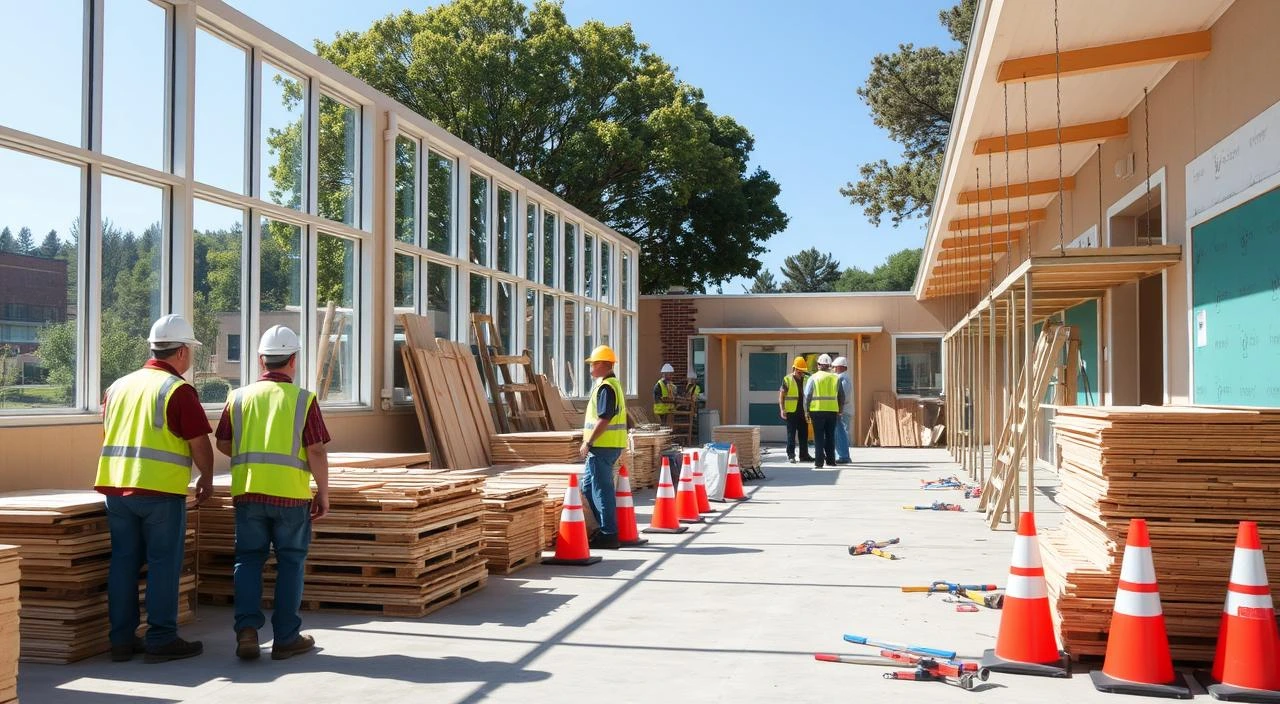Did you know that 63.6% of construction businesses, including those for schools, fail within five years? Starting a school contracting business is a big challenge. But, the rewards are worth it. This guide will help you start your school contracting business and aim for success.
Key Takeaways
- Understand the diverse services in demand for educational institutions, from construction and maintenance to specialized consulting.
- Conduct thorough market research to identify your target market and analyze the competition within the school contracting industry.
- Develop a detailed business plan. It should cover your services, target market, financial plans, and how you will operate.
- Properly register your business, get the right licenses and permits, and get insurance. This keeps you legal and safe.
- Use marketing to reach and connect with schools, school districts, and educational groups.
Understanding the School Contracting Business
Starting a school contracting business means knowing what services to offer. You can help schools with construction and renovation, maintenance and repairs, janitorial and cleaning services, landscaping and groundskeeping, educational consulting, IT and technology services, and security services.
Construction and Renovation
Construction and renovation projects for schools can be very profitable. You can earn from $20,000 to over $100,000 per contract. By focusing on these areas, your business can become a go-to for schools looking to improve or expand their facilities.
Maintenance and Repairs
Keeping schools in good shape is key. Your business can handle everything from fixing leaks to repairing roofs. This ensures schools’ buildings and grounds stay in top condition.
Janitorial and Cleaning Services
Clean and safe learning environments are a must for schools. Your business can offer detailed janitorial and cleaning services. This keeps classrooms, hallways, and common areas clean and inviting.
Landscaping and Groundskeeping
The look of a school’s outdoor spaces matters a lot. Your business can provide landscaping and groundskeeping services. This includes lawn care, gardening, and snow removal to make the campus welcoming and well-kept.
Educational Consulting
Your business can also help with educational consulting. This might include helping with curriculum, training teachers, or integrating technology into learning. It’s a way to support schools in improving their academic offerings.
IT and Technology Services
Technology is vital in today’s classrooms. Schools need reliable IT support and services. Your business can ensure schools’ tech systems are current and working well.
Security Services
School safety is a major concern. Your business can offer security services like installing systems, monitoring, and training staff. This helps create a safe learning environment for students and staff.
Knowing all the services your business can offer helps you tailor your services to each school’s needs. This makes your business a valuable partner in their success.
Conduct Market Research
Before starting your school contracting business, it’s key to do thorough market research. You need to know what services are in demand, who your competitors are, and what schools in your area need. This research helps you shape your business plan. You can gather this info through interviews, surveys, focus groups, and data analysis.
Identify Your Target Market
Your main customers will be public and private schools. This includes elementary, middle, and high schools. When picking your target market, think about school size, type, location, and budget. Making educated guesses is important for your research.
Analyze the Competition
Looking into your competitors can show you what sets you apart. This includes services, prices, and how happy customers are. Knowing who your customers are helps you pick the right people for your research. Paying them can make them more likely to participate.
It’s vital to keep your research unbiased to get reliable data. Using this data to make your products better is a big part of market research. This process should keep going to meet customer needs better over time.
| Type of Market Research | Description |
|---|---|
| Interviews | One-on-one conversations with possible customers to get detailed insights |
| Focus Groups | Group talks to see what customers think and like |
| Product/Service Use Research | Watching how customers use your products to find ways to improve |
| Observation-Based Research | Watching how customers act in their own space to find needs they don’t meet |
“The global market research services market is expected to grow from around $75 billion in 2021 to $90.79 billion by 2025.”
Develop a Business Plan
Creating a detailed business plan is key to starting your school contracting business. This document will guide you, outlining your goals, strategies, and financial outlook. It shows you understand the industry, your market, and what sets you apart. It also details how you’ll operate, market, and manage finances.
The main parts of a business plan for a school contracting business are:
- Executive Summary: A brief summary of your business, including your mission, what you offer, and financial plans.
- Company Description: Detailed info about your business, like its structure, who owns it, the team, and its history.
- Market Analysis: A deep dive into your market, competitors, and trends, showing what makes you special.
- Services Offered: A full description of what you provide, including prices, who you serve, and your supply chain.
- Marketing and Sales Strategy: Your plan for getting and keeping customers, using tactics like social media and content creation.
- Financial Projections: A detailed look at your business’s finances, including income, expenses, and profits over three years.
By making a solid business plan, you get a roadmap for success and a tool to get funding and investors. A well-written plan is vital for your business’s growth and success.
| Key Components of a Business Plan | Description |
|---|---|
| Executive Summary | A brief overview of your business, including your mission, what you offer, and financial plans. |
| Company Description | Detailed info about your business, like its structure, ownership, team, and history. |
| Market Analysis | A deep dive into your market, competitors, and trends, showing what makes you special. |
| Services Offered | A full description of what you provide, including prices, who you serve, and your supply chain. |
| Marketing and Sales Strategy | Your plan for getting and keeping customers, using tactics like social media and content creation. |
| Financial Projections | A detailed look at your business’s finances, including income, expenses, and profits over three years. |
“A well-crafted business plan is essential for the success of your school contracting business. It will serve as your roadmap, outlining your business goals, strategies, and financial projections.”
Register Your Business and Obtain Licenses
After you have a good business plan, it’s time to legally register your school contracting business. You’ll also need to get any required licenses. The exact steps depend on where you are and what services you provide.
Choose a Business Structure
There are several business structures for school contracting businesses. These include sole proprietorships, partnerships, limited liability companies (LLCs), and corporations. Each has its own benefits and drawbacks. It’s key to pick the one that suits you best.
Register Your Business Name
If you want to use a name other than your own, you must register a “Doing Business As” (DBA) name. This makes sure your business name is unique and officially recognized in your state.
Obtain an Employer Identification Number (EIN)
You’ll also need an Employer Identification Number (EIN) from the IRS. This nine-digit number is for tax purposes. It’s needed for many business tasks, like opening a bank account.
Get the Necessary Licenses and Permits
You might need different licenses and permits based on your services. For example, in California, contractors need a specific license for their work. All contractors must also have a $25,000 contractor license bond.
FAQ
What services does a school contracting business typically provide?
A school contracting business can do many things. They handle construction and renovation, and also maintenance and repairs. They also do janitorial and cleaning, landscaping, and groundskeeping.
They offer educational consulting, IT and technology services, and security services too.
How do I identify my target market for a school contracting business?
To find your target market, think about school size and type. Also, consider the location and budget. Look at the needs of public and private schools in your area.
This includes elementary, middle, and high schools.
What should be included in a business plan for a school contracting business?
A good business plan should have an executive summary and a company description. It should also have a market analysis and a list of services offered.
Include your marketing and sales strategy, and financial projections. This plan will guide you to success.
What legal considerations do I need to keep in mind when starting a school contracting business?
When starting, think about your business structure. You might choose a sole proprietorship, partnership, LLC, or corporation. Register your business name and get an Employer Identification Number (EIN).
You’ll also need licenses and permits. This includes a contractor’s license and permits for specific services.
How do I market my school contracting business?
Good marketing for a school contracting business includes networking. Talk to school administrators and have a strong online presence. Also, join local industry events.
Use your reputation and customer satisfaction to get referrals and repeat business.
What are the financial considerations for starting a school contracting business?
Starting a school contracting business needs upfront money. This includes business registration, licensing, equipment, and marketing. You’ll also have ongoing expenses like labor, materials, insurance, and overhead.
Good financial planning and projections are key to your business’s success.

My name is Jakir, I am a content writer, content creator, I give business, sports, finance, trending news and I have 10 years of experience in this and this is my blog goldennews24.com.










